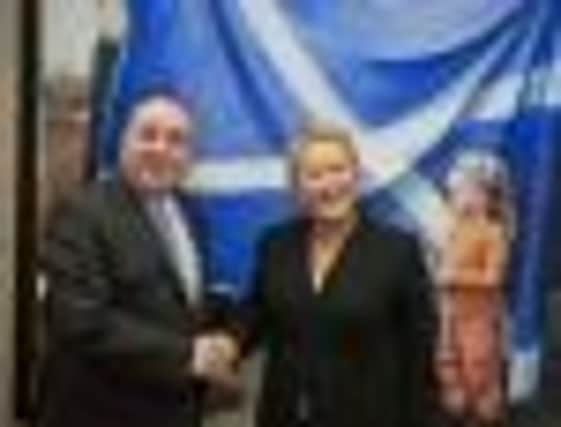Tom Peterkin: Quebec agenda not a fit for SNP


So, at first glance, it seemed a little strange to observe Salmond play it cool this week when he had the chance to play the statesman when he met with Pauline Marois, Quebec’s premier and leader of the Partis Quebecois.
Why should Salmond chose not to make a song and dance of his meeting with the leader of a political party, which, at face value, has much in common with the SNP? It was a question that was exercising the minds of the sizeable Quebecois press corps, who made the long trip to Edinburgh to report on the meeting.
Advertisement
Hide AdAdvertisement
Hide AdHaving been denied a joint press conference with the two leaders on Wednesday afternoon, a slightly disconsolate group squeezed into a bus which took them from the Scottish Parliament to the Caledonian Hotel in Edinburgh’s West End.
There, Marois was to host an impromptu press conference with Salmond conspicuous by his absence. The visiting journalists had been led to believe from PQ spinners that the meeting would be a “separatism summit” with the two leaders comparing notes on their independence plans. But as Marois revealed to the media in the Caley’s foyer, Salmond had declined her offer to pass over information on the constitutional wrangling that has defined Quebec’s recent political history. The Scottish Government’s official explanation for the disappointment felt by the foreign press corps was that there had been a “disconnect” between their expectations of the meeting and the reality of the courtesy normally extended to leaders of her status.
One can, however, speculate that Salmond might have good reason not to trumpet their meeting. The First Minister might not be keen to associate his political cause with one that has experience two narrow failures in two referendums and a political period which the PQ’s opponents have characterised as a “neverendum”. There are also the strong ties between Scotland and Canada. Would Salmond be keen to stand on the same platform as someone trying to engineer secession from a state which has proved a home-from-home for so many Scots?
Finally, the sort of cultural separatism that has historically been associated with the movement for Quebecois sovereignty does not chime with the SNP’s notion of civic nationalism.
The PQ has been keen to emphasise Quebec’s use of the French language and its distinctive culture, whereas modern SNP rhetoric talks of independence being the best way for Scotland to achieve its aspirations rather than being about national identity. Perhaps that is why journalists visiting Edinburgh left with unfulfilled expectations.